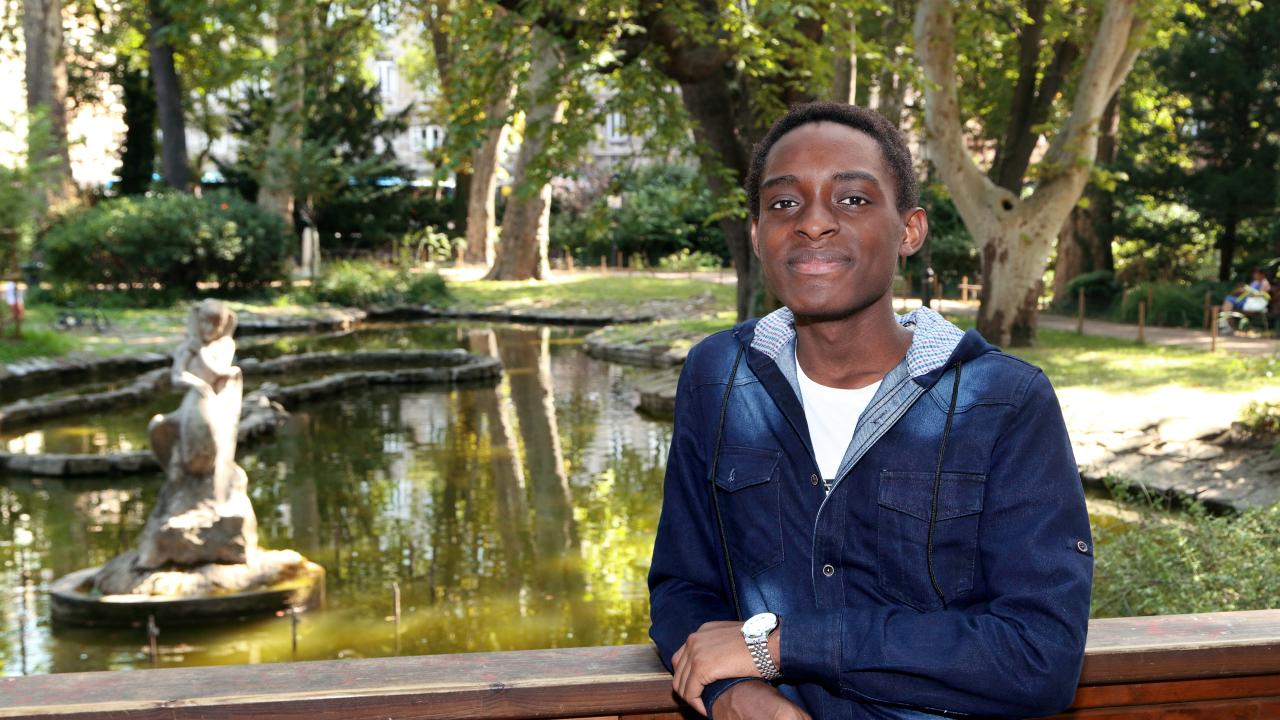
When he received the invitation letter to enrol in the ICTP Postgraduate Diploma Programme, Alain Didier Noutchegueme did not have much time to decide. He was studying engineering at ISSEA, the Sub-Regional Institute of Statistics and Applied Economics in his home country, Cameroon, and had just a few days to pack his things and move to Italy. The idea of having the opportunity to visit ICTP and meet high-level mathematicians convinced him to accept the invitation and start a new adventure.
Noutchegueme, also known as “Noutch” by his colleagues and professors at ICTP, has just graduated in the Math section of the ICTP Diploma Programme as the best student in his section. “I wasn’t sure I wanted to study engineering anymore,” he says, “and I was hoping that maybe at ICTP I would find answers to my many questions.”
During his undergraduate studies, Noutchegueme was studying pure mathematics at the University of Yaoundé, focussing especially on analysis, a field that he really enjoyed, even though it sometimes felt purely abstract. “At a certain point I started to ask myself - is what I am doing really useful? Is it really interesting? Is it the best thing I can do?” Therefore, he decided to study engineering as well, while completing his Master’s degree in mathematics, and try to find a field more attached to reality, to study things that can actually be seen or touched. He spent a year studying in an interdisciplinary field of applied science, at the intersection between engineering, economics and statistics.
Gradually, however, he started to feel that what he was studying was not exactly what he wanted to do. On one hand, he was still interested in finding something concrete and tangible, but on the other hand he understood that what he really was interested in was pure mathematics. He then followed the advice of a professor and decided to apply for the ICTP Diploma Programme, to study the subject further. “Discussing with professors and other mathematicians at ICTP, I figured out that geometry, even if it is purely theoretical, has a lot of things you can actually see,” he says.
At ICTP, Noutchegueme worked under the supervision of Professor Giovanni Bellettini on a thesis on “Minimal surfaces”, a topic at the intersection between analysis and geometry. The problem of minimal surfaces was particularly exciting for Noutchegueme because it is a purely theoretical work, but at the same time interesting and easy to visualize. A minimal surface can be seen as the way soap film shapes itself between a wire contour. “In my work, we asked ourselves: if we dip a closed wire into soap, will it always exist a soap surface for any shape this wire makes?” says Noutchegueme. “The answer is yes, and we are trying to dig deeper to understand how it works and what are the properties of this phenomenon.”
Noutchegueme has other reasons to be happy about his year at ICTP. “First of all, Trieste is a very beautiful city, it was a very nice experience and I have never learned so much in my life,” says Noutchegueme. “What I learned during the courses at ICTP makes up maybe just 20% of everything I learned here,” he says. “My classmates, for example, taught me a lot of things and I acquired an incredible amount of abilities and soft skills during the past year.”
He remembers, for example, a specific book than one of his colleagues suggested to him: The Princeton companion to mathematics by William Timothy Gowers. Reading it had a great impact on him: “This book answered one of the big questions I had: why would someone continue to do research in mathematics?” The direct interaction and discussion with professors contributed to give another important source of personal growth and learning, in spite of virtual meetings and remote lectures due to the Coronavirus lockdown beginning last March. “It was hard not to be face to face with professors and colleagues, but I am very happy with what I acquired from this experience,” says Noutchegueme. “I learned how to write a CV, how to write a personal letter, how to be more productive. I also learned how to communicate better, and be a better speaker.”
With all this new knowledge and acquired experience, Noutchegueme is now ready for a new chapter in his life. He was accepted at the University of Montreal, Canada, for a PhD in geometry and analysis, focussing on spectral geometry. “In the future, I would like to be the best mathematician possible, so when I return to my home country, I can give more opportunities to young students,” says Noutchegueme. His role model is his father, who worked as a professor of mathematics in Cameroon. “Most of my math teachers used to be my father’s students, and I heard a lot about him and about the impact that he had on them. I would like to have at least the same impact on my own students in the future.”
Noutchegueme is now still in Trieste, waiting for bureaucracy and international mobility restrictions to be sorted out in order to move to Canada, and using this extra time to enjoy the sea of Trieste a little longer. “If ICTP would open again, the cafeteria would be the first place I would like to go,” he says, “I really liked the pasta there and I missed it during lockdown!” But what was really missing during the months of remote learning and virtual meetings was ICTP’s vibrant atmosphere of collaboration: “I really missed the discussions with the professors and all their advice, all their suggestions on how to handle problems, both in mathematics and in everyday life.”
---- Marina Menga
















